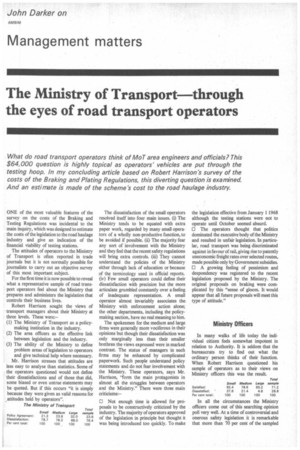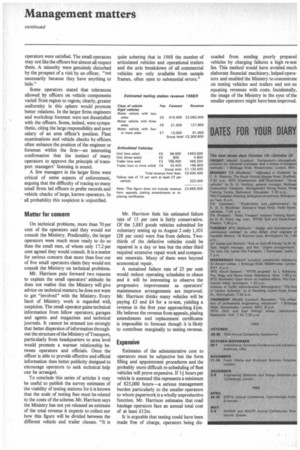The Ministry of Transport through the eyes of road transport operators
Page 71

Page 72

If you've noticed an error in this article please click here to report it so we can fix it.
What do road transport operators think of MoT area engineers and officials? This $64,000 question is highly topical as operators' vehicles are put through the testing hoop. In my concluding article based on Robert Harrison's survey of the costs of the Braking and Plating Regulations, this diverting question is examined. And an estimate is made of the scheme's cost to the road haulage industry.
ONE of the most valuable features of the survey on the costs of the Braking and Testing Regulations was incidental to the main inquiry, which was designed to estimate the costs of the legislation to the road haulage industry and give an indication of the financial viability of testing stations.
The attitudes of operators to the Ministry of Transport is often reported in trade journals but it is not normally possible for journalists to carry out an objective survey of this most important subject.
For the first time it is now possible to reveal what a representative sample of road transport operators feel about the Ministry that prepares and administers the legislation that controls their business lives.
Robert Harrison sought the views of transport managers about their Ministry at three levels. These were:—
(1) The Ministry of Transport as a policymaking institution in the industry.
(2) The area officers as the effective link between legislation and the industry.
(3) The ability of the Ministry to define problem areas of legislation to operators and give technical help where necessary. Mr. Harrison stresses that attitudes are less easy to analyse than statistics. Some of the operators questioned would not define their dissatisfactions and of those that did, some biased or even untrue statements may be quoted. But if this occurs "it is simply because they were given as valid reasons for attitudes held by operators". The dissatisfaction of the small operators resolved itself into four main issues. (i) The Ministry tends to be equated with extra paper work, regarded by many small operators of a wholly non-productive function, to be avoided if possible. (ii) The majority fear any sort of involvement with the Ministry and they feel that the recent safety regulations will bring extra controls. (iii) They cannot understand the policies of the Ministry either through lack of education or because of the terminology used in official reports. (iv) Few small operators could define their dissatisfaction with precision but the more articulate grumbled constantly over a feeling of inadequate representation. A small operator almost invariably associates the Ministry with enforcement action alone; the other departments, including the policymaking section, have no real meaning to him.
The spokesmen for the medium and large firms were generally more vociferous in their opinions but though their dissatisfaction was only marginally less than their smaller brethren the views expressed were in marked contrast. The status of managers in such firms may be enhanced by complicated paperwork. Such people understand policy statements and do not fear involvement with the Ministry. These operators, says Mr. Harrison, "form the main protagonists in almost all the struggles between operators and the Ministry." There were three main criticisms:
0 Not enough time is allowed for proposals to be constructively criticized by the industry. The majority of operators approved of the legislation in principle but thought it was being introduced too quickly. To make the legislation effective from January 1 1968 although the testing stations were not to operate until October seemed absurd.
0 The operators thought that politics dominated the executive body of the Ministry and resulted in unfair legislation. In particular, road transport was being discriminated against in favour of rail, giving rise to patently uneconomic freight rates over selected routes, made possible only by Government subsidies. 0 A growing feeling of pessimism and despondency was registered to the recent legislation proposed by the Ministry. The original proposals on braking were complicated by this "sense of gloom. It would appear that all future proposals will meet this type of attitude."
Ministry Officers
In many walks of life today the individual citizen feels somewhat impotent in relation to Authority. It is seldom that the bureaucrats try to find out what the ordinary person thinks of their function. When Robert Harrison questioned his sample of operators as to their views on Ministry officers this was the result.
In all the circumstances the Ministry officers come out of this searching opinion poll very well. At a time of controversial and onerous safety legislation it is remarkable that more than 70 per cent of the sampled operators were satisfied. The small operators may not like the officers but almost all respect them. A minority were genuinely disturbed by the prospect of a visit by an officer, "not necessarily because they have anything to Some operators stated that tolerances allowed by officers on vehicle components varied from region to region; clearly, greater uniformity in this sphere would promote better relations. In the larger firms engineers and workshop foremen were not dissatisfied with the officers. Some, indeed, were sympathetic, citing the large responsibility and poor salary of an area officer's position. Fleet examinations and vehicle checks by officers often enhance the position of the engineer or foreman within the firm—an interesting confirmation that the instinct of many operators to approve the principle of transport managers' licensing is sound.
A few managers in the larger firms were critical of some aspects of enforcement, arguing that the difficulty of tracing so many small firms led officers to prefer records and vehicle checks of large, known operators. In all probability this suspicion is unjustified.
Matter for concern On technical problems, more than 70 per cent of the operators said they would not consult the Ministry. Predictably, the larger operators were much more ready to do so than the small men, of whom only 17.2 per cent agreed they would consult. It is a matter for serious concern that more than four out of five small operators claim they would not consult the Ministry on technical problems.
Mr. Harrison puts forward two reasons to explain the small operators' attitude: he does not realize that the Ministry will give advice on technical matters; he does not want to get "involved" with the Ministry. Every facet of Ministry work is regarded with. suspicion. The small operator gains technical information from fellow operators, garages and agents and magazines and technical journals. It cannot be stressed too strongly that better dispersion of information throughout the structure of the Ministry of Transport, particularly from headquarters to area level would promote a warmer relationship between operators and officials. Once the officer is able to provide effective and official information then better publicity designed to encourage operators to seek technical help can be arranged.
To conclude this series of articles it may be useful to publish the survey estimates of the viability of testing stations for it is known that the scale of testing fees must be related to the costs of the scheme. Mr. Harrison says the Ministry has not yet released an estimate of the total revenue it expects to collect nor how this figure will be divided between the different vehicle and trailer classes. "It is quite sobering that in 1968 the number of articulated vehicles and operational trailers and the axle breakdown of all commercial vehicles are only available from sample frames, often open to substantial errors."
Estimated testing station revenue 196819
Class of vehicle Fee Forecast Revenue Rigid vehicles Motor vehicle with two axles £5 416,400 £2.082.000 Motor vehicle with three axles £6 21,300 127,800 Motor vehicle with four or more axles £7 13.000 91,000 Group total: £2,300.800
Articulated Vehicles
Unit (two axles) £5 98.600 E493,000 Unit (three axles) E6 800 4.800 Trailer (one axle) E3 155,400 466.200 Trailer (two or more axles) £4 42.400 169.600 Group total f 1,133.600 Total revenue from fees: £3,434,400 Failure rate of 15 per cent at least £2 per vehicle: 222.000 Note: This figure does not include revenue £3.656.000 from appeals, plating amendments or replacing certificates.
Mr. Harrison feels his estimated failure rate of 15 per cent is fairly conservative. Of the 3,885 goods vehicles submitted for voluntary testing up to August 2 only 1,101 (28 per cent) were free from defects. Twothirds of the defective vehicles could be repaired in a day or less but the other third required extensive repair work and component renewals. Many of them were beyond economical repair.
A sustained failure rate of 25 per cent would reduce operating schedules to chaos and it will be interesting to observe the progressive improvement as operators' maintenance arrangements are improved. Mr. Harrison thinks many vehicles will be paying £3 and £4 for a re-test, yielding a revenue in the first year approaching L+m. He believes the revenue from appeals, plating amendments and replacement certificates is impossible to forecast though it is likely to contribute marginally to testing revenue.
Expensive Estimates of the administrative cost to operators must be subjective but the form filling and appointment procedures and the probably more difficult re-scheduling of fleet vehicles will prove expensive. If 1+ hours per vehicle is assessed this represents a minimum of 825,000 hours—a serious management burden particularly to the smaller operators to whom paperwork is a wholly unproductive function. Mr. Harrison estimates that road haulage operators face an annual total cost of at least £12m.
It is arguable that testing could have been made free of charge, operators being dis
is suaded
suaded from sending poorly prepared vehicles by charging failures a high re-test fee. This method would have avoided much elaborate financial machinery, helped operators and enabled the Ministry to concentrate on testing vehicles and trailers and not on equating revenues with costs. Incidentally, the image of the Ministry in the eyes of the smaller operators might have been improved.
























































































































